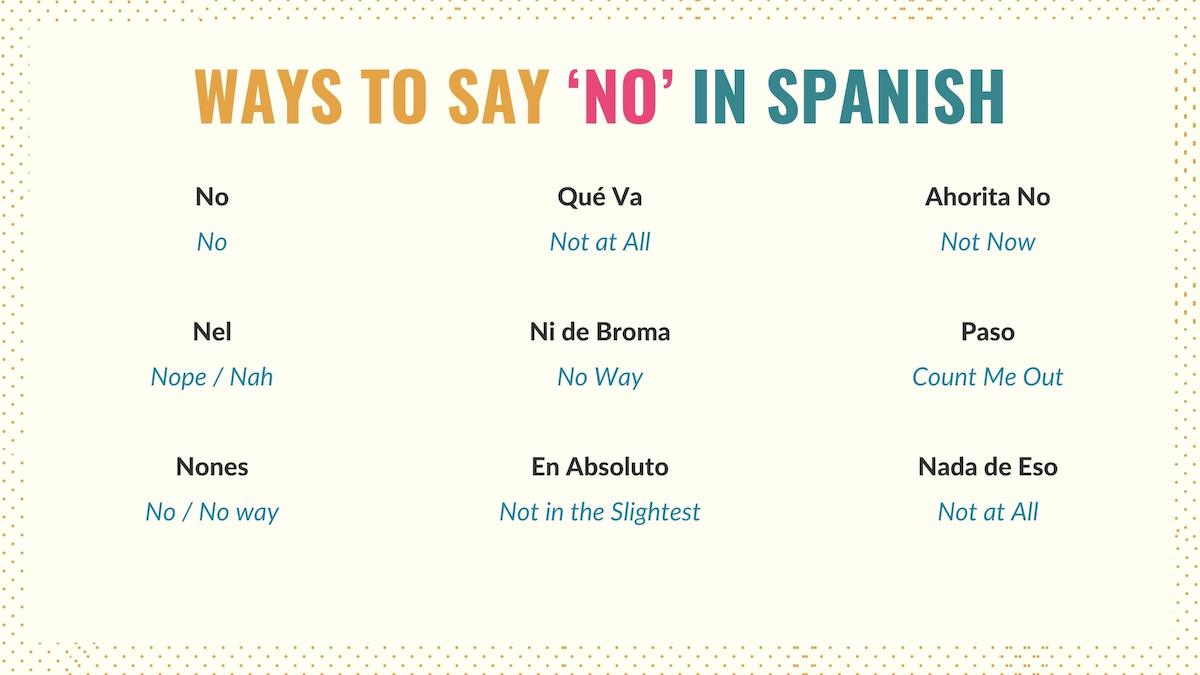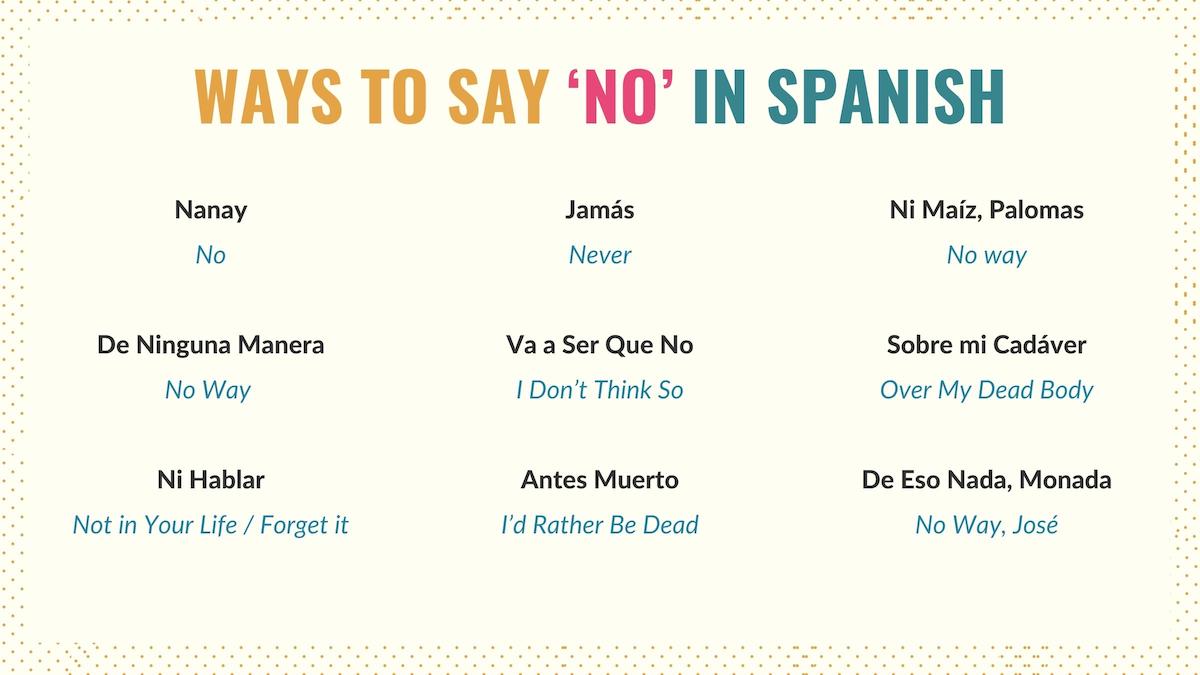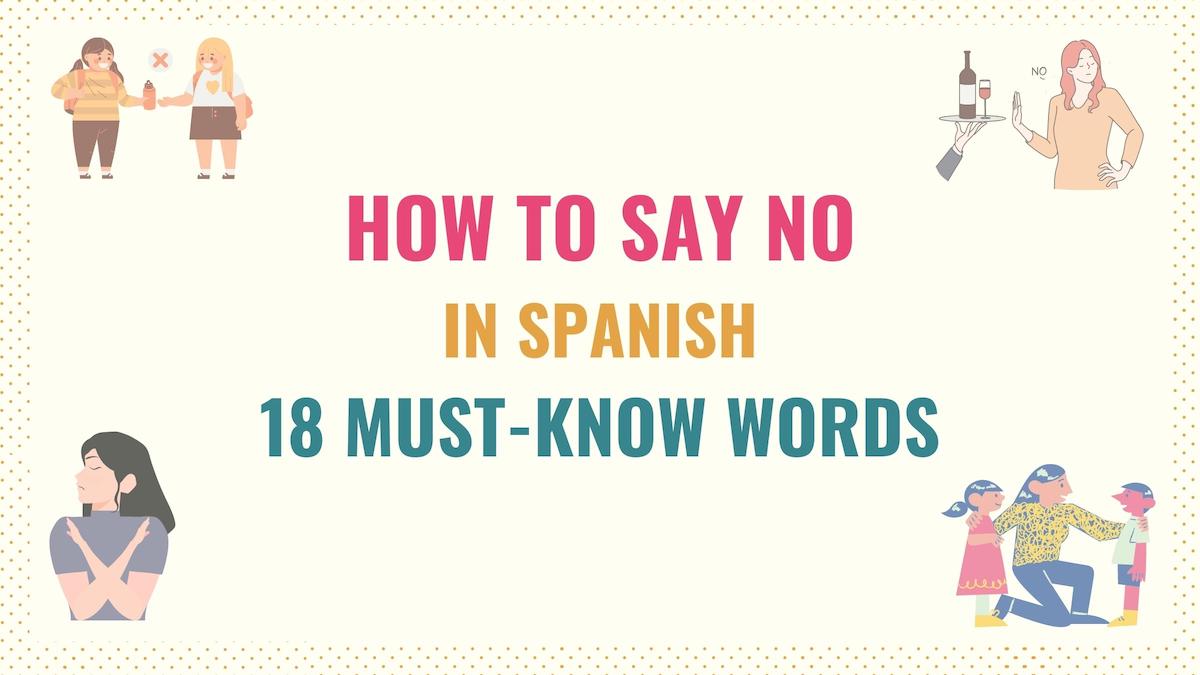Like in any other language, there are different ways to say no in Spanish. And you should learn them because these variations can take your vocabulary to the next level. If you’ve ever wondered how to say no in Spanish in different situations, you need to check out this article.
Below, you’ll find common terms and expressions, examples, and short explanations of how to use them. By the end of this, you’ll know how to say ‘no’ in Spanish more naturally.

1. No – No
In Spanish, no is the standard term we use to deny something or provide a negative answer to a statement. To sound more natural, work on your pronunciation of the Spanish letter ‘o’.
No, gracias, yo estoy bien.
No, thank you, I’m okay.
No, yo no soy Adriana.
No, I’m not Adriana.
Take Note: When combined with the impersonal form of haber, ‘no’ can be used to refer to the lack of something. No hay sillas (there are no chairs).
2. Nel – Nope / Nah
Nel is a popular Mexican slang word used to say ‘no’ in Spanish. Since it’s an informal term, it’s close in meaning to ‘nope’ and ‘nah’.
Nel, mañana no puedo.
No, I can’t make it tomorrow.
| Spanish | Translation |
|---|---|
| Güey, ¿has visto mi celular? | Dude, have you seen my phone? |
| Nel. ¿Ya checaste tu mochila? | Nope. Did you check your backpack? |
3. Nones – No / No way
Nones is an informal Spanish word that means ‘no’ or ‘no way’. If you want to be cheeky, you can use its variation ‘nones, para los preguntones’.
Le pregunté si iba a venir y dijo que nones.
I asked her if she would come, and she said no.
| Spanish | English |
|---|---|
| ¿Me prestas esta blusa? | Can I borrow this blouse? |
| ¡Nones! | No way! |
4. Nanay – No
Nanay is another informal word for saying ‘no way’ or ‘no’ in Spanish. Since it’s more casual, this word sounds more friendly than a blunt no.
| Spanish | English |
|---|---|
| ¿Vas a venir mañana? | Are you coming tomorrow? |
| Nanay. Mañana es mi día libre. | No. Tomorrow is my day off. |
5. De Ninguna Manera – No Way
De ninguna manera is a polite and firm way to say ‘no’ in Spanish. As a result, you can use it in both formal and informal situations. Depending on the context, de ninguna manera means ‘no way’ or ‘absolutely not’.
| Spanish | English |
|---|---|
| Pá, ¿me dejas ir a una fiesta? | Dad, can I go to a party? |
| ¡De ninguna manera! Estás castigado. | Absolutely not! You’re grounded. |
Tip: ‘De ningún modo’ is a common variation of ‘de ninguna manera’.
6. Ni Hablar – Not in Your Life / Forget it
In Spanish, the expression ni hablar is used to firmly reject or say ‘no’. It’s close in meaning to ‘not in your life’, ‘forget it’, or ‘no way’.
| Spanish | English |
|---|---|
| Mamá, ¿puedo llevarme el carro? | Mom, can I take the car? |
| ¡Ni hablar! Nunca llegas a tiempo. | Not in your life! You’re never on time. |
7. Qué Va – Not at All
In Castilian (Spain) Spanish, qué va is a colloquial expression used to deny something. In some contexts, ‘qué va’ can be used to deny something ironically. It can be translated as ‘no way’, ‘heck no’ or ‘not at all’.
| Spanish | English |
|---|---|
| ¿Lo pasaste bien este fin de semana? | Did you enjoy your weekend? |
| ¡Qué va! Tuve que trabajar. | Not at all. I had to work. |
8. Ni de Broma – No Way
Ni de broma is a firm and colloquial expression. Use it when you want to imply there’s no room to negotiate. Ni de broma, and its variations, can be translated as ‘no way’, ‘not in your life’ or ‘do not even joke about it’.
Some variations of this negative expression include:
- Ni de chiste
- Ni lo sueñes
- Ni se te ocurra
- Ni a tiros
Sally dijo que ni de broma te va a ayudar.
Sally said that there’s no way she’s going to help you.
9. En Absoluto – Not in the Slightest
If you’re wondering how to say ‘no’ in Spanish formally, you should use the phrase en absoluto. On top of being formal, this expression will also help you sound more firm and determined. En absoluto can be translated as ‘not at all’ or ‘not in the slightest’.
| Spanish | English |
|---|---|
| ¿Ha tenido algún inconveniente con los vecinos? | Have you had any inconvenience with your neighbors? |
| En absoluto. Todos son muy agradables. | Not in the slightest. They are all very nice. |
Take Note: Spanish definite articles can also be used to express possession and your relationship with someone.

10. Jamás – Never
Although it’s usually combined with other Spanish negative words, jamás can also be used alone as a resounding ‘no’.
| Spanish | English |
|---|---|
| ¿Te gustaría aprender a tocar la guitarra? | Would you like to learn how to play guitar? |
| Jamás. No me gusta la música. | Never. I don’t like music. |
11. Va a Ser Que No – I Don’t Think So
Va a ser que no is a casual expression used in Castilian Spanish to say ‘no’ defiantly. This phrase is close in meaning to “I don’t think so”, “that’s not going to happen” or “in your dreams”.
Pues, va a ser que no. Ya tengo planes.
Well, I don’t think so. I already have plans.
12. Antes Muerto – I’d Rather Be Dead
Antes muerto is a strong and decisive phrase you can use when denying or refusing to do something. Due to its intensity, this expression can come off as rude.
| Spanish | English |
|---|---|
| ¿Quieres ir el partido conmigo? | Do you want to go to the game with me? |
| Antes muerto. El fútbol me aburre. | I’d rather be dead. I find soccer boring. |
Tip: Muerto is a past participle adjective. As a result, it must agree in gender and number with the person using the expression.
13. Ahorita No – Not Now
Ahorita no is a casual and polite phrase to refuse to do something. As a result, it’s a common expression you can use to say ‘no’ in Spanish. It’s close in meaning to ‘not now’, ‘no’ or ‘not right now’.
Ahorita no, gracias. Sólo estamos viendo.
Not now, thank you. We’re just looking around.
14. Paso – Count Me Out
When with friends, paso is a common term you can use to say that you do not want to take part in something. ‘Paso’ means “count me out” or “I’ll pass”.
Yo paso, chavos. Estoy muy cansado.
Count me out, guys. Estoy muy cansado.
15. Nada de Eso – Not at All
Nada de eso is a carefree way of saying ‘no’ in Spanish. This expression is more commonly used to deny something, and it’s close in meaning to ‘not at all’ or ‘no way’.
| Spanish | English |
|---|---|
| Déjame ayudarte a limpiar. | Let me help you clean up. |
| Nada de eso. Por favor, siéntate. | Not at all. Please, sit. |
16. Ni Maíz, Palomas – No way
‘Ni maíz’ or ‘ni maíz, palomas’ is a Mexican slang expression used to say ‘no’ or ‘no way’ in a friendly and funny way.
Ni maíz, siempre pierdes mis cosas.
No way, you always lose my stuff.
Ni madres and ni de coña are vulgar variations you can use in this context. Just keep in mind that ‘ni de coña’ is only used in Castilian Spanish.
17. Sobre mi Cadáver – Over My Dead Body
Sobre mi cadáver is a decisive (and a bit dramatic) phrase to say ‘no’ in Spanish when refusing to do something.
| Spanish | English |
|---|---|
| ¿Invitamos a Karen a la fiesta? | Should we invite Karen to the party? |
| ¡Sobre mi cadáver! Es muy desagradable. | Over my dead body! She’s nasty. |
18. De Eso Nada, Monada – No Way, José
De eso nada, monada is the equivalent of ‘no way, José’. As a result, this is a gentle way of saying ‘no’ in Spanish.
| Spanish | English |
|---|---|
| ¡Ándale, préstame dinero! | Come on. Lend me some money. |
| De eso nada, monada. Nunca me pagas. | No way, José. You never pay me back. |
Wrapping Up
Now that you know the most common expressions native speakers use to say ‘no’ in Spanish, it’s time for you to start incorporating these words and phrases into your conversations. ¡Buena suerte!
Downloadable PDF: Different Ways to Say No in Spanish
Feel free to download high-resolution graphics of the different standard and slang terms to say no in Spanish to study later or share with others!
Resources to Learn Spanish Negative Words & Vocab
To improve your vocabulary, you should also learn negative and affirmative words in Spanish. If you like to learn different ways to express the same idea, here are some support guides you can check:

